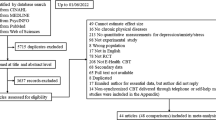Abstract
In the past decade, the use of internet-based cognitive behavioral treatments (internet-based CBT) for a wide range of patients has grown intensively. Incorporating the patients’ opinions and perspective into new health care innovations might improve the quality and applicability of these innovations, as high dropout rates and low attrition are the often-reported concerns in E-health research. Most studies to date have examined patient perspectives on specific internet-based interventions that patients had participated in, and not the views of the general public. The current paper explores the perspective of patients with rheumatoid arthritis and psoriasis on internet-based CBT for these patient groups. In total, 100 patients (55 % male) participated in a semi-structured telephone interview about internet-based CBT, including questions about possible advantages and disadvantages and the readiness to participate in this kind of treatment. Most patients (78 %) were prepared to participate in internet-based CBT. Patients endorsed the advantages (57 %) more often than the disadvantages (34 %). The ease of internet-based CBT and the time saved were especially appealing to patients. Main disadvantages according to patients are that not all patients will be reached due to computer illiteracy and the lack of face-to-face interaction with the therapist. The results suggest that, from the patients’ perspective, internet-based CBT is a promising health care development. Further research into aspects such as therapist interaction and enhancing computer literacy might contribute to an effective way of E-health care delivery in the future.


Similar content being viewed by others
References
Guadagnoli E, Ward P (1998) Patient participation in decision-making. Soc Sci Med 47(3):329–339
Quest E, Aanerud GJ, Kaarud S, Collins S, Leong A, Smedeby B, Denny-Waters A, Mellors R, Taylor D, De Wit M (2003) Patients’ perspective. J Rheumatol 30(4):884–885
Griffiths F, Lindenmeyer A, Powell J, Lowe P, Thorogood M (2006) Why are health care interventions delivered over the internet? A systematic review of the published literature. J Med Internet Res 8(2):e10
Cuijpers P, Van Straten A, Andersson G (2008) Internet-administered cognitive behavior therapy for health problems: a systematic review. J Behav Med 31(2):169–177
Andersson G (2009) Using the Internet to provide cognitive behaviour therapy. Behav Res Ther 47(3):175–180
Eysenbach G (2005) The law of attrition. J Med Internet Res 7(1)
Donkin L, Christensen H, Naismith SL, Neal B, Hickie IB, Glozier N (2011) A systematic review of the impact of adherence on the effectiveness of E-therapies. J Med Internet Res 13(3):e52
Christensen H, Griffiths KM, Farrer L (2009) Adherence in internet interventions for anxiety and depression. J Med Internet Res 11(2)
Ahern DK, Kreslake JM, Phalen JM (2006) What is eHealth (6): perspectives on the evolution of eHealth research. J Med Internet Res 8(1)
Kaltenthaler E, Sutcliffe P, Parry G, Beverley C, Rees A, Ferriter M (2008) The acceptability to patients of computerized cognitive behaviour therapy for depression: a systematic review. Psychol Med 38(11):1521–1530
Andersson G, Cuijpers P (2009) Internet-based and other computerized psychological treatments for adult depression: a meta-analysis. Cogn Behav Ther 38(4):196–205
Cuijpers P, Marks IM, van Straten A, Cavanagh K, Gega L, Andersson G (2009) Computer-aided psychotherapy for anxiety disorders: a meta-analytic review. Cogn Behav Ther 38(2):66–82
Marks IM, Cuijpers P, Cavanagh K, van Straten A, Gega L, Andersson G (2009) Meta-analysis of computer-aided psychotherapy: problems and partial solutions. Cogn Behav Ther 38(2):83–90
Spek V, Cuijpers P, NykIiček I, Riper H, Keyzer J, Pop V (2007) Internet-based cognitive behavior therapy for symptoms of depression and anxiety: a meta-analysis. Psychol Med 37(3):319–328
Baker NA, Rogers JC, Rubinstein EN, Allaire SH, Wasko MC (2009) Problems experienced by people with arthritis when using a computer. Arthritis Care Res 61(5):614–622
King G, Heaney DJ, Boddy D, O’Donnell CA, Clark JS, Mair FS (2011) Exploring public perspectives on e-health: findings from two citizen juries. Health Expect 14(4):351–360
Postel MG, De Haan HA, De Jong CAJ (2008) E-therapy for mental health problems: a systematic review. Telemed J E Health 14(7):707–714
Wantland DJ, Portillo CJ, Holzemer WL, Slaughter R, McGhee EM (2004) The effectiveness of web-based vs. non-web-based interventions: a meta-analysis of behavioral change outcomes. J Med Internet Res 6(4)
Palmqvist B, Carlbring P, Andersson G (2007) Internet-delivered treatments with or without therapist input: does the therapist factor have implications for efficacy and cost. Expert Rev Pharmacoecon Outcomes Res 7(3):291–297
Joinson AN, Reips UD, Buchanan T, Schofield CBP (2010) Privacy, trust, and self-disclosure online. Hum Comput Interact 25(1):1–24
Reisenwitz T, Iyer R, Kuhlmeier DB, Eastman JK (2007) The elderly’s internet usage: an updated look. J Consum Market 24(7):406–418
Acknowledgments
This research was supported by grants from the Dutch Science Organization ZonMw and Wyeth Pharmaceuticals.
Ethics committee
The regional ethics committee of the Radboud University Nijmegen Medical Centre indicated that there was no approval needed for the protocol of this study.
Disclosures
None.
Author information
Authors and Affiliations
Corresponding author
Appendix 1
Appendix 1
Short explanation of internet-based CBT at the beginning of the interview with patients.
At this moment we are developing an internet-based treatment for patients with rheumatoid arthritis and psoriasis at the Radboud University Nijmegen Medical Centre. This treatment is aimed at learning to deal with the consequences of the illness for daily life, such as pain and fatigue. We would like to investigate what patients see as important aspects of internet treatments and what they think of several advantages and disadvantages. You could help us gain a better understanding of patients’ perspectives.
Rights and permissions
About this article
Cite this article
Ferwerda, M., van Beugen, S., van Burik, A. et al. What patients think about E-health: patients’ perspective on internet-based cognitive behavioral treatment for patients with rheumatoid arthritis and psoriasis. Clin Rheumatol 32, 869–873 (2013). https://doi.org/10.1007/s10067-013-2175-9
Received:
Revised:
Accepted:
Published:
Issue Date:
DOI: https://doi.org/10.1007/s10067-013-2175-9



